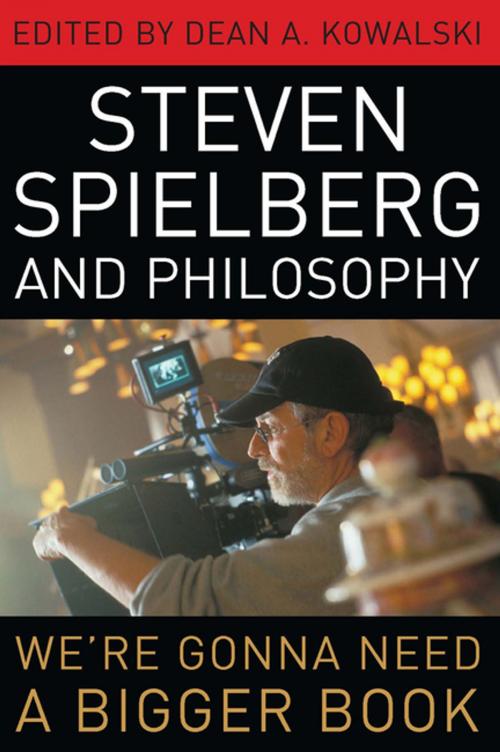Steven Spielberg and Philosophy
We're Gonna Need a Bigger Book
Nonfiction, Entertainment, Performing Arts, Religion & Spirituality, Philosophy, Social & Cultural Studies, Social Science| Author: | ISBN: | 9780813138701 | |
| Publisher: | The University Press of Kentucky | Publication: | November 21, 2008 |
| Imprint: | The University Press of Kentucky | Language: | English |
| Author: | |
| ISBN: | 9780813138701 |
| Publisher: | The University Press of Kentucky |
| Publication: | November 21, 2008 |
| Imprint: | The University Press of Kentucky |
| Language: | English |
Has any film director had a greater impact on popular culture than Steven Spielberg? Whether filming Holocaust heroes and villains, soldiers, dinosaurs, extraterrestrials, or explorers in search of the Holy Grail, Spielberg has given filmgoers some of the most memorable characters and wrenching moments in the history of cinema. Whatever his subject -- war, cloning, slavery, terrorism, or adventure -- all of Spielberg's films have one aspect in common: a unique view of the moral fabric of humanity. Dean A. Kowalski's Steven Spielberg and Philosophy is like a remarkable conversation after a night at the movie theater, offering new insights and unexpected observations about the director's most admired films. Some of the nation's most respected philosophers investigate Spielberg's art, asking fundamental questions about the nature of humanity, cinema, and Spielberg's expression of his chosen themes. Applying various philosophical principles to the movies, the book explores such topics as the moral demands of parenthood in War of the Worlds; the ultimate unknowability of the "other" in Close Encounters of the Third Kind and Schindler's List; the relationship between nature and morality in Jurassic Park; the notion of consciousness in A.I.: Artificial Intelligence; issues of war theory and ethics in Munich; and the foundation of human rights in Amistad. Impressive in scope, this volume illustrates the philosophical tenets of a wide variety of thinkers from Plato to Aquinas, Locke, and Levinas. Contributors introduce readers to philosophy while simultaneously providing deeper insight into Spielberg's approach to filmmaking. The essays consider Spielberg's movies using key philosophical cornerstones: metaphysics, epistemology, ethics, axiology, aesthetics, and political philosophy, among others. At the same time, Steven Spielberg and Philosophy is accessible to those new to philosophy, using the philosophical platform to ponder larger issues embedded in film and asking fundamental questions about the nature of cinema and how meanings are negotiated. The authors contend that movies do not present philosophy -- rather philosophy is something viewers do while watching and thinking about films. Using Spielberg's films as a platform for discussing these concepts, the authors contemplate questions that genuinely surprise the reader, offering penetrating insights that will be welcomed by film critics, philosophers, and fans alike.
Has any film director had a greater impact on popular culture than Steven Spielberg? Whether filming Holocaust heroes and villains, soldiers, dinosaurs, extraterrestrials, or explorers in search of the Holy Grail, Spielberg has given filmgoers some of the most memorable characters and wrenching moments in the history of cinema. Whatever his subject -- war, cloning, slavery, terrorism, or adventure -- all of Spielberg's films have one aspect in common: a unique view of the moral fabric of humanity. Dean A. Kowalski's Steven Spielberg and Philosophy is like a remarkable conversation after a night at the movie theater, offering new insights and unexpected observations about the director's most admired films. Some of the nation's most respected philosophers investigate Spielberg's art, asking fundamental questions about the nature of humanity, cinema, and Spielberg's expression of his chosen themes. Applying various philosophical principles to the movies, the book explores such topics as the moral demands of parenthood in War of the Worlds; the ultimate unknowability of the "other" in Close Encounters of the Third Kind and Schindler's List; the relationship between nature and morality in Jurassic Park; the notion of consciousness in A.I.: Artificial Intelligence; issues of war theory and ethics in Munich; and the foundation of human rights in Amistad. Impressive in scope, this volume illustrates the philosophical tenets of a wide variety of thinkers from Plato to Aquinas, Locke, and Levinas. Contributors introduce readers to philosophy while simultaneously providing deeper insight into Spielberg's approach to filmmaking. The essays consider Spielberg's movies using key philosophical cornerstones: metaphysics, epistemology, ethics, axiology, aesthetics, and political philosophy, among others. At the same time, Steven Spielberg and Philosophy is accessible to those new to philosophy, using the philosophical platform to ponder larger issues embedded in film and asking fundamental questions about the nature of cinema and how meanings are negotiated. The authors contend that movies do not present philosophy -- rather philosophy is something viewers do while watching and thinking about films. Using Spielberg's films as a platform for discussing these concepts, the authors contemplate questions that genuinely surprise the reader, offering penetrating insights that will be welcomed by film critics, philosophers, and fans alike.















